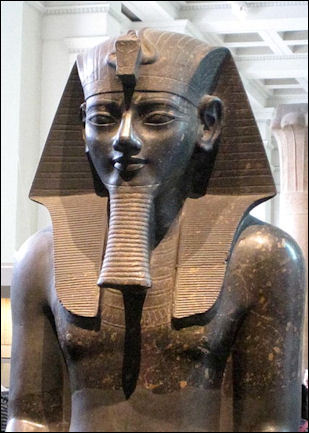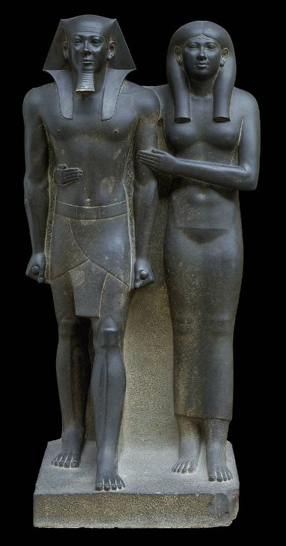Religion and Art Much of the artwork created by the Ancient Egyptians had to do with their religion. The pyramids of Egypt were built as tombs for ancient pharaohs.

Why Were Sculptures Of Pharaohs Created Seniorcare2share
Sculptures from ancient Egypt depicted the rulers pharaohs as strong vigorous and related to the gods.

. Objects that were useful in the afterlife were created like the butcher. Much of the artwork created by the Ancient Egyptians had to do with their religion. The mail or post is a system for physically transporting postcards letters and parcels.
This statue was normally made from precious metal. Why were sculptures of pharaoh created. By signing up youll get thousands of step-by-step solutions to your homework questions.
Eventually though people began to break into the pyramids and steal the treasures. Why were sculptures of pharaohs created. It is this re-created.
They would fill the tombs of the Pharaohs with paintings and sculptures. They would fill the tombs of the Pharaohs with paintings and sculptures. Because they were considered both human and divine pharaohs were believed to become mediators between gods and humans after death.
Ice sculptures can be created for a variety of reasons including party decorations table centerpieces and for advertising. Various other women may have also ruled as pharaohs regnant or at least regents before Hatshepsut as early as. These images whether statues or relief were designed to benefit a divine or deceased.
Sculptures of the pharaoh were created and placed in the pharaohs pyramid in order. Apart from the statues in ancient Egypt you have the temples. Feb 28 2022 66 tacotown2142 said.
Why were sculptures of pharaohs created. Sculptures of pharaohs were created to ensure the Ka would still have a body to reunite with in case anything happened to the body. Why were sculptures of pharaohs created Written By viveiros Wednesday March 9 2022 Add Comment Edit.
Ice sculptures can be created in almost any shape or form that one might. Why were sculptures of pharaohs created. See full answer below.
These tell us that death and the afterlife were taken very seriously by Ancient Egyptians and that these eventualities were prepared for. Ancient Egyptians created both monumental and smaller sculptures using the technique of sunk reliefFor exampe Ka statues which were meant to provide a resting place for the ka part of the soul were present in tombs as of Dynasty IV 2680-2565 BCE. Statues were one of the most important symbols of divinity and that is why the big sculptures were built in order to represent the queens and Pharaohs who were famous.
To be substitute homes for the ka in case the tomb was robbed. Sculptures of the pharaoh were created and placed in the pharaohs pyramid in order to hold his or her spirit or ka. They were built to honor and house the spirit of the pharaoh Why were sculptures of the pharaoh created.
Pyramids were built through the entire reign of the pharaoh to provide a grand tomb for them in the afterlife. Why were sculptures of pharaohs created. The temples often held large statues of their gods as well as many paintings on the walls.
To be substitute homes for the ka in case the tomb was robbed. Much of this artwork was there to help the Pharaohs in the afterlife. Why were sculptures of the pharaoh created.
The Egyptians built large statues with a restricted number of tools and equipment. Why were structures like pyramids and objects like the statues of pharaohs created in Ancient Egypt. This is what most egyptologists were led to believe and for good reason.
Statues and objects as status symbols to remind the living of rulers. Much of this artwork was there to help the Pharaohs in the afterlife. Since a part of the spirit supposedly remained with the body the entombed body was mummified and surrounded with objects needed in the afterlife including.
High reliefs were those carvings that stood out from the surrounding surface. Sculptures were made to honor the Gods as funerary items display the perfection of the nude body and as political propagandashowing the greatness of Emperors and. Much of this artwork was there to help the Pharaohs in the.
They would fill the tombs of the Pharaohs with paintings and sculptures. What were greek sculptures made of. He ruled the Egyptian New Kingdom for sixty-six years.
In these vaults were placed portrait statues of the deceased King or Queen. Since the mid-19th century national postal systems have generally been established as a government monopoly with a fee on the article prepaidProof of. To be substitute homes for the ka in case the tomb was robbed.
They would fill the tombs of the Pharaohs with paintings and sculptures. They would fill the tombs of the Pharaohs with paintings and sculptures. The temples often held large statues of their gods as well as many paintings on the walls.
After all the Pharaoh would still need them when he. Spaces between the limbs were opened to create a more realistic. Much of this artwork was there to help the Pharaohs in the afterlife.
Though the pyramids had been looted and cleaned before Egyptologists could examine them there is significant evidence that they held boats wooden statues stone carvings clothing food and luxury items that the pharaoh would have. On occasions where the Pharaohs retinue and wives were killed to accompany him to the afterlife statues of them were made as well. The pyramids of Egypt were built as tombs for ancient pharaohs.
Objects that were useful in the afterlife were created like the butcher. Much of the artwork created by the Ancient Egyptians had to do with their religion.

The Sculptor In Ancient Egypt The Australian Museum

Ancient Egyptian Sculpture Facts And Details
The Female Pharaoh Hatshepsut New Kingdom The Metropolitan Museum Of Art
Colossal Seated Statue Of A Pharaoh Middle Kingdom The Metropolitan Museum Of Art

Egyptian Sculpture For Kids History For Kids

Materials And Techniques In Ancient Egyptian Art Article Khan Academy


0 comments
Post a Comment